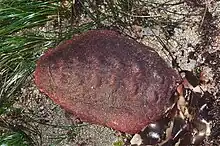chiton
English
Pronunciation
- (General American) IPA(key): /ˈkaɪtn̩/, /ˈkaɪtɑn/
- (Received Pronunciation) IPA(key): /ˈkaɪtn̩/, /ˈkaɪtɒn/
- Rhymes: -aɪtən
Etymology 1
From Ancient Greek χιτών (khitṓn, “tunic”), from a Central Semitic *kittan, from the Akkadian 𒌆𒃰 (kitû, literally “flax, linen”), from Sumerian 𒄑𒃰 (kitû [GIŠ.GADA]).
Alternative forms
Noun
chiton (plural chitons or chitones)
- (historical) A loose woolen tunic worn by men and women in Ancient Greece.
- 1992, Donna Tartt, The Secret History:
- On the night of our first attempt, we simply overdrank and passed out in our chitons in the woods near Francis’s house.
- 1998, Colette Susan Czapski, “NM238: A Hellenistic Statue and Its Archaistic Support”, in Kim J. Hartswick, Mary Carol Sturgeon, editors, Stephanos: Studies in Honor of Brunilde Sismondo Ridgway, page 53:
- She wears a diaphanous himation that covers her torso, over a floor-length chiton of heavier fabric.
Translations
Greek tunic
|
See also
 Chiton (costume) on Wikipedia.Wikipedia
Chiton (costume) on Wikipedia.Wikipedia
Noun
chiton (plural chitons)
- Any of various rock-clinging marine molluscs of the class Polyplacophora, including the genus Chiton.
Synonyms
- (mollusc): coat-of-mail shell, gumboot, loricate, polyplacophoran, polyplacophore, sea cradle, sea bug (archaic)
Translations
mollusc
|
Anagrams
Dutch
Pronunciation
- IPA(key): /ˈxi.tɔn/
- Hyphenation: chi‧ton
Etymology 1
Borrowed from Ancient Greek χιτών (khitṓn).
Etymology 2
Borrowed from Ancient Greek χιτών (khitṓn).
French
Pronunciation
- IPA(key): /ki.tɔ̃/
Etymology 1
Borrowed from Ancient Greek χιτών (khitṓn, “tunic”).
See also
 Chiton (vêtement) on the French Wikipedia.Wikipedia fr
Chiton (vêtement) on the French Wikipedia.Wikipedia fr
Further reading
- “chiton”, in Trésor de la langue française informatisé [Digitized Treasury of the French Language], 2012.
- “chiton” in Émile Littré, Dictionnaire de la langue française, 1872–1877.
Romanian
Declension
This article is issued from Wiktionary. The text is licensed under Creative Commons - Attribution - Sharealike. Additional terms may apply for the media files.
